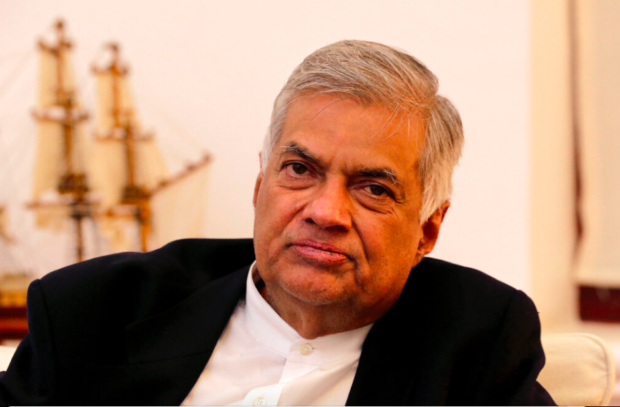
In this Friday, Nov. 2, 2018 file photo, ousted Sri Lankan Prime Minister Ranil Wickremesinghe listens during an interview with the Associated Press at his official residence in Colombo, Sri Lanka. AP
COLOMBO, Sri Lanka — Government dysfunction and an intelligence failure that preceded the Easter Sunday bombings in Sri Lanka are traced to simmering divisions between the president and prime minister after a weekslong political crisis that crippled the country last year.
The government has admitted to a “lapse of intelligence” after officials failed to act upon near-specific information received from foreign agencies. Suicide bombers exploded themselves last Sunday in three churches and three luxury hotels, killing 253 people and wounding 400 more. Authorities said eight Muslim militants blew themselves up at their targets while the wife of one of the attackers blasted herself on being rounded up by police.
The carnage has brought forth arguments that worshippers and holidaymakers fell victim to the rivalry and a lack of communication between the country’s two leaders — President Maithripala Sirisena and Prime Minister Ranil Wickremesinghe.
The Cabinet led by Wickremesinghe says neither he nor his ministers were informed of the intelligence received by the defense authorities. Sirisena is the head of state, defense minister, minister in charge of the police and head of the armed forces. He also chairs the National Security Council, which includes the heads of security agencies and departments. Traditionally the prime minister also plays an important role on the council.
According to Health Minister Rajitha Senaratne, Sirisena has not included Wickremesinghe in national security affairs since a dispute between them came into the open in October last year. This is an unusual departure from the protocol, he said.
Senaratne said that Sirisena was overseas when the attacks took place and even after that, the National Security Council refused to meet with Wickremesinghe as he tried to give them instructions.
Sirisena has also said that he was not informed of the intelligence received and vowed to overhaul the leadership of the defense forces.
The top bureaucrat at the Defense Ministry, Hemasiri Fernando, has resigned at Sirisena’s insistence.
“It is a major factor,” said Jehan Perera, the head of local activist group National Peace Council, referring to the alleged lack of coordination between the leaders contributing to the failure to prevent the attacks.
“The primary responsibility has to be taken by the president, he did not give the information and he did not act,” Perera said. “He had the Ministry of Defense, took the police from the prime minister, chaired the National Security Council meetings and did nothing,” Perera said.
Kusal Perera, a journalist and political commentator, says security and intelligence officials should have acted on the information whether or not they received orders from politicians.
“If they (Wickremesinghe and his party) were not invited to the National Security Council, why did not they say in Parliament that they were not responsible for the security of the country any longer,” said Perera, who is not related to Jehan Perera.
“Saying that now is taking political advantage, not taking responsibility,” he said.
Sirisena and Wickremesinghe belong to different political parties but came together for Sirisena’s presidential campaign in 2015. Their relationships broke down and their differences exploded last year when Sirisena suddenly sacked Wickremesinghe as prime minister and appointed in his place former strongman Mahinda Rajapaksa, whom he defeated in the presidential election. The crisis crippled the country for more than seven weeks to the point of not being able to pass this year’s national budget on time.
A court decision compelled Sirisena to reappoint Wickremesinghe, but the two leaders have been rivals within the same government.
Rajapaksa, who is the minority leader in Parliament, blames the government for weakening intelligence and dropping its guard, which he had maintained to defeat the separatist Tamil Tiger rebels 10 years ago to end the 26-year-old civil war. He also criticized the government for the detention of intelligence officers accused of extrajudicial killings and abductions during the closing days of the war, which he said crippled the security apparatus before the bombings. According to conservative U.N estimates, some 100,000 people were killed in Sri Lanka’s conflict.
Sirisena summoned an all-party conference Thursday to which Wickremesinghe was also invited. At the conference, Sirisena stressed “setting aside all the political beliefs and difference (so that) everybody should collectively commit towards building a peaceful environment within the country,” a statement from his office said.
“It is not a secret that the disagreements between me and the government aggravated over the past two years,” Sirisena told the country’s media executives Friday. “One of the reasons for that is weakening of military intelligence and arresting military officials unnecessarily and my speaking up against it within and outside the government.”
Jehan Perera said that the security threat could prove politically advantageous to Rajapaksa and his family, with a presidential election scheduled at the end of this year. Gotabhaya Rajapaksa, a younger brother of Mahinda, was the powerful defense secretary during his brother’s reign and has expressed his interest to join the contest.
“People are saying we want a stronger leader and they are talking about Gotabhaya. It (the blasts) has worked to their benefit,” Perera said. /ee